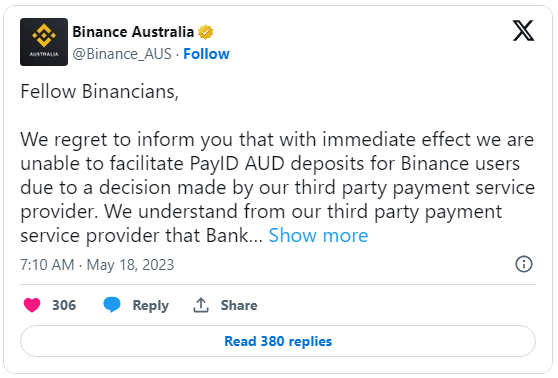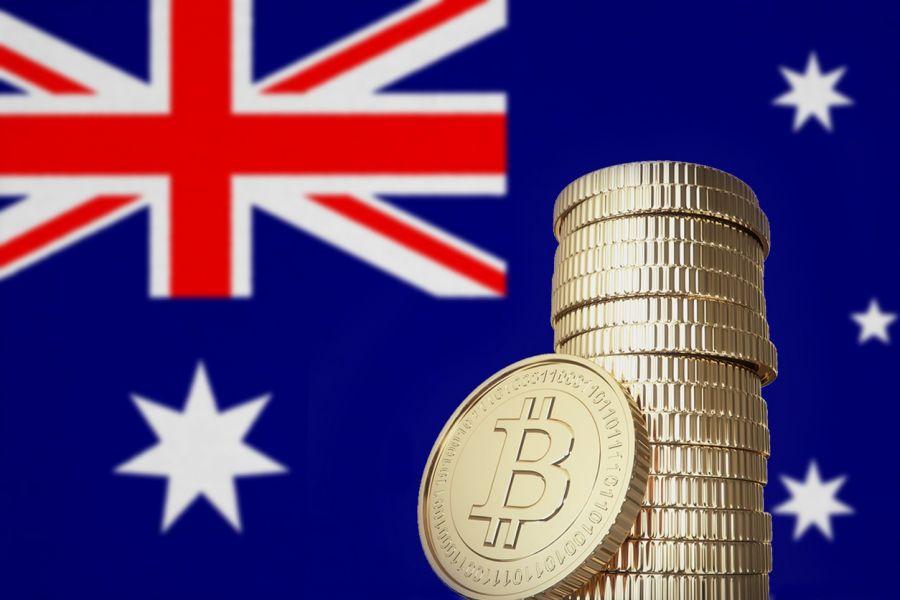During an interview conducted at the Intersect Fintech conference in Melbourne, Australia, on August 31st, Ben Rose, who serves as the General Manager of Binance Australia, conveyed his strong belief in the competence of Australian regulators when it comes to shaping digital asset regulations within the nation.
This expression of confidence from Rose stands in stark contrast to the recent hurdles and regulatory scrutiny that Binance Australia has encountered.
In the month of May, the exchange faced an abrupt disruption in its services when its payment provider abruptly terminated its collaboration, citing concerns related to a “high risk” of scams and fraudulent activities.
Binance Australia communicated to its user base that they would no longer have access to Australian dollar deposits and withdrawals, attributing this decision to actions undertaken by an undisclosed third-party service provider.

Reports suggested potential ties to Westpac, a prominent Australian bank, which had concurrently introduced limitations on fund transfers to select cryptocurrency exchanges.
Additionally, Australia’s Commonwealth Bank (CBA) imposed partial constraints on bank-related payments to cryptocurrency exchanges, citing apprehensions regarding scams and potential financial losses for their customers.
In July, the Australian Securities and Investments Commission (ASIC) initiated investigations at the offices of Binance Australia. These inquiries primarily centered around the exchange’s classification of its clients as either retail or wholesale investors.
Back in April, Binance had already announced the closure of its local derivatives exchange due to the misclassification of certain Australian users as wholesale investors.
While ASIC neither officially confirmed nor denied the searches, they acknowledged that their review of Binance Australia remained ongoing.
In contrast, Binance underscored its unwavering commitment to collaborating closely with local authorities and adhering to regulatory standards in Australia.
Ben Rose, the spokesperson for Binance, emphasized their strong dedication to reestablishing banking relationships and fiat ramp services for their one million Australian customers.
He remarked, “We are actively engaged in discussions and actively working towards the necessary changes.” Despite the challenges, Rose maintains an optimistic outlook on Australian regulators ultimately making sound decisions regarding cryptocurrency regulation.
He underscored the significance of the forthcoming Treasury consultation on licensing frameworks in Australia, expressing confidence that it will wield considerable influence.
Rose also pointed out the constructive dialogue between industry stakeholders and regulators as a sign of progress. He said, “I am confident that we will reach a resolution, hopefully sooner rather than later.”
Advancements in Australian Crypto Regulation: Perspectives from Industry Professionals
Christian Westerlind Wigstrom, representing Monoova, a prominent payment provider in Australia, highlighted the significant uptick in dialogues between major cryptocurrency exchanges and policymakers.
He recognized the concerns of banks regarding potential scams but called for more nuanced and proactive discussions involving regulators, financial institutions, and leaders within the cryptocurrency industry. Wigstrom stressed the importance of collaborative efforts.
Moreover, during Australian Blockchain Week on June 26th, Trevor Power, an assistant secretary at the Australian Treasury, shared insights into the forthcoming framework intended for classifying tokens based on their functionality and purpose.
Regarding the timeline for dedicated cryptocurrency legislation, Power indicated that a reasonable expectation would be for such legislation to emerge around 2024. However, the precise timing hinges on how Australia’s lawmakers receive the proposed framework.
Power underscored that the framework, as outlined in the token mapping paper, is designed to categorize tokens by evaluating their functionality, ecosystem, and intrinsic value.
The objective is to establish a regulatory framework that aligns with these core principles, simplifying the classification of tokens. He emphasized that this framework is intended to be technology-neutral and not confined to specific token types.







